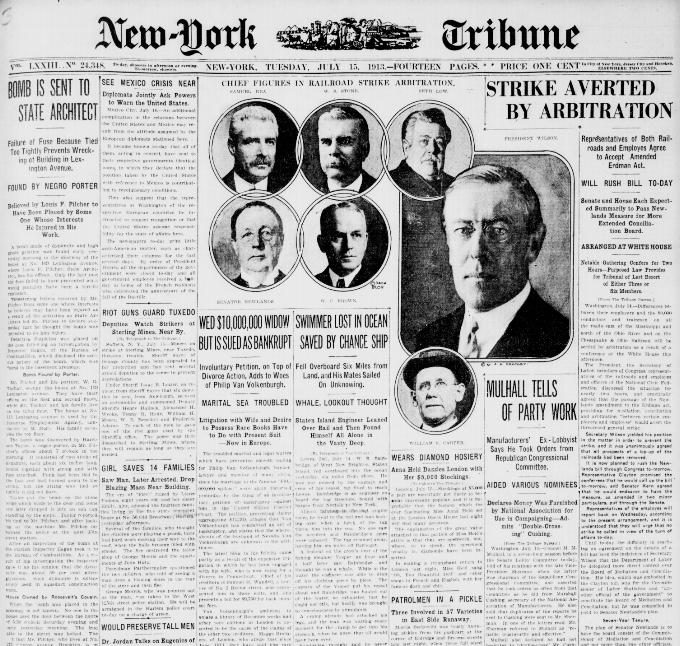|
Moderated by NW Okie! |
Volume 15 , Issue 282013Weekly eZine: (366 subscribers)Subscribe | Unsubscribe Using Desktop... |
15 July 1913 - Talk of Lobbyists in Congress

One hundred years ago there was talk of Republicans and Lobbyists, and how Mulhall did a lot of "double-crossing."
On the front page of the New york Tribune dated Tuesday, July 15, 1913, several interesting headlines of that day. One of those was "Mulhall Tells of Party Work," manufacturers' Ex-lobbyist says he took orders from Republican congressional committee; Aided various nominees; declared money was furnished by National association for use in campaigning, admitting double-crossing Cushing.
Washington, July 14 (1913) -- Colonel M. M. Mulhall, in a seven hour session before the Senate Lobby Committee, told of his relations with the late Vice President Sherman when the latter was chairman of the Republican Congressional Committee, and asserted that he took orders as often from that committee as he did from Marshall Cushing, secretary of the National Association of Manufacturers. He also said that duplicated of the reports he sent to Cushing were sent to Mr. Sherman. In one of the letters read, Mr. Sherman referred to Mulhall as "reliable, trustworthy and effective."
Mulhall also declared he had not hesitated to "double-cross" Mr. Cushing when it suited his convenience.
The former lobbyist asserted that $60,000 had been spent to re-elect Mr. Littlefield to Congress in maine, most of which came front he manufacturers' association, and told how he purchased the support of Dr. G. L. Crockett, a Democratic leader, for $500.
Mulhall gleefully related that he had received a letter from the Hearst camp during the campaign of 1906, which he used to obtain information for the Republican candidate for Congress int he 24th new York District.
The witness did not show the least emotion in telling how he "double-crossed" Marshall Cushing, his friend and confidant, when the latter was forced out of the National Manufacturers' Association. This he did by making a report of everything Cushing said and did to James Van Cleave, who was responsible for Cushing's retirement front he organization.
When Col. Mulhall took the stand the dove of peace hovered over the heads of the two belligerent lobby committees, and from then on no attempt would be made by the House investigators to interfere wight he work of the Senators. When Mulhall finished his testimony before the Senate committee he would be talked in hand by the House investigators, so that the colonel had a hot time ahead of him.
Just before the noon recess Mulhall became peeved over the publication of stories regarding his motives in making his letters public, and he asserted that he wanted to give the letters away until he fell into the hands of Richard Barry, whom he described as a "newspaper tipster." Mulhall read a letter he had sent to Perriton Maxwell, editor of "Hearst's Magazine," in which he said he did not want any money, but wanted the letters published "as a service tot he public."
Besides that story there was headlines of "Railroad Strike Has Been Averted."
| View or Add Comments (0 Comments)
| Receive
updates ( subscribers) |
Unsubscribe
| © . Linda Mcgill Wagner - began © 1999 Contact Me | |
